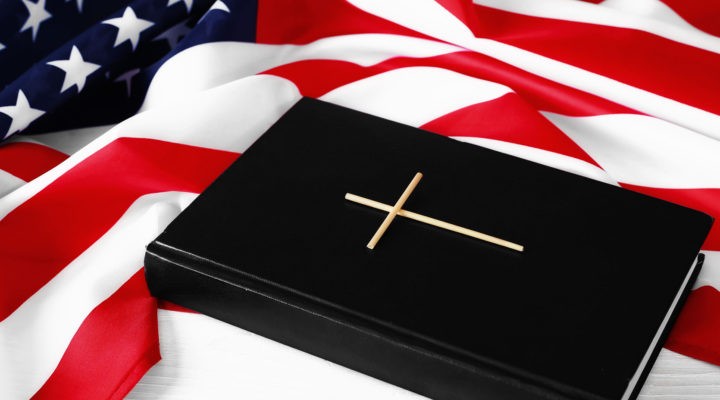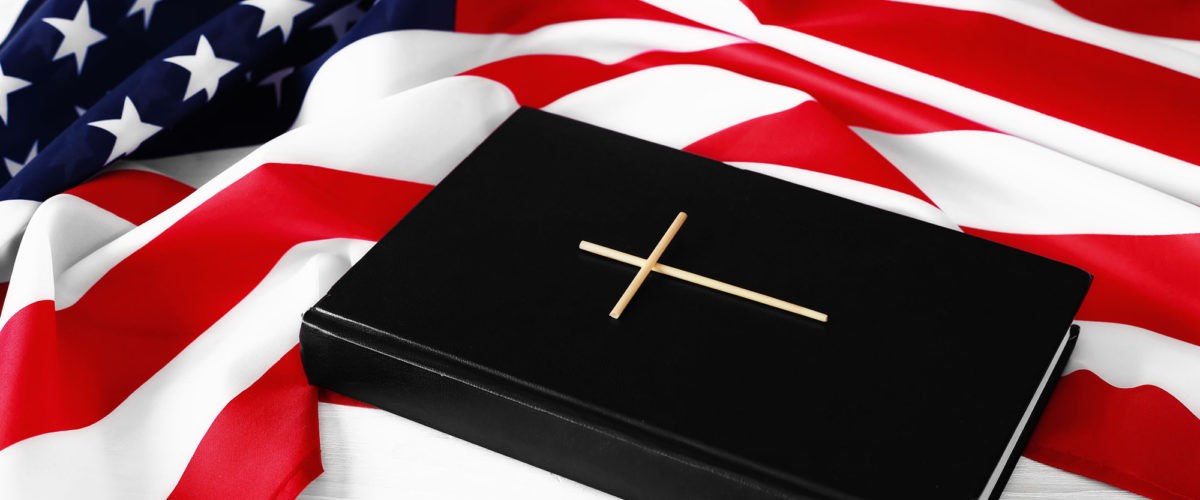Christian nationalism has seeped so deeply into the fabric of American religious and political life that arguing with its adherents is frustrating and unproductive, according to Amanda Tyler, executive director of BJC.
Tyler spoke during a Feb. 26 webinar titled “Confronting Christian Nationalism in Your Congregation” sponsored by BJC.
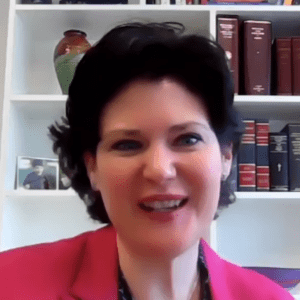
Amanda Tyler
This frustration at not being able to talk to family members and friends doesn’t mean Christians must silently submit to the corrosive ideology that has fueled numerous acts of violence, including the Jan. 6 storming of the U.S. Capitol, she added. “Christian nationalism is not going to be uprooted by posting an article on Facebook, but through conversation and one-on-one relationships.”
During the webinar, she offered commentary and slides covering the definition of Christian nationalism, how to recognize its numerous forms and why it is not, as its followers claim, simply an expression of faith and patriotism. She also presented viewers with steps they can take to confront Christian nationalism in their own churches.
What is Christian nationalism?
Christian nationalism is a “political ideology and cultural framework that seeks to merge American and Christian identities,” she said.
That translates into an exaggerated form of American nationalism energized by the belief that God’s “providential hand” is directly involved in American history and politics and that the United States was created as a Christian nation “founded to privilege Christianity in some way.”
Christians need to take this ideology seriously because it seeks to coopt elements of faith to serve power-driven political ends, she warned. “The ‘Christian’ in Christian nationalism is more about identity than religion.”
“The ‘Christian’ in Christian nationalism is more about identity than religion.”
Nor is the movement a patriotic one, she explained. Patriotism is about love of country while nationalism requires “allegiance to country that demands supremacy over all other allegiances, including to Jesus.”
Polling data has teased out language that adopters of Christian nationalism often use in some form. They include beliefs and statements such as:
- “The federal government should declare the United States a Christian nation.”
- “The success of the United States is part of God’s plan.”
- “The federal government should advocate Christian values.”
Tyler advised against stereotyping the ideology’s adopters because polling has shown that a fifth of Americans reject Christian nationalism outright while another fifth, known as ambassadors, are fully steeped in it.
And nothing will dampen potential dialogue like name-calling, she said. “Don’t label them as Christian nationalists. We all find ourselves on a spectrum. The majority of the country are somewhere in the middle, not on the polar ends.”
Connection to racism
As she did during a National Press Club virtual luncheon last June, Tyler connected the dots between Christian nationalism, racism and white supremacy.
“Christian nationalism often overlaps with and provides cover for white supremacy and racial subjugation,” she said, noting the nation’s history of slavery and racial injustice often are rationalized as part of God’s plan.
“Christian nationalism and racism are similar in that they are forces in our society and pervade our society.”
How to spot Christian nationalism
Christian nationalism appears in a variety of ways, some easier to spot than others, Tyler explained.
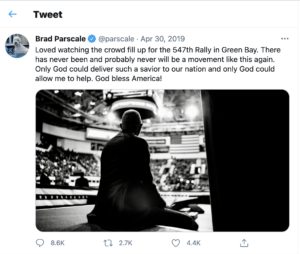 During Donald Trump’s administration, it was common to hear the former president described in messianic terms. To illustrate, Tyler presented a 2019 tweet by then-presidential adviser Brad Parscale describing Trump as “a savior to our nation” that God alone could deliver.
During Donald Trump’s administration, it was common to hear the former president described in messianic terms. To illustrate, Tyler presented a 2019 tweet by then-presidential adviser Brad Parscale describing Trump as “a savior to our nation” that God alone could deliver.
Many of the Trump supporters who assaulted the U.S. Capitol also described feeling called to be there and offered an overtly Christian prayer in the Senate chamber, she added.
Such actions conflate divinity with American politics so that God becomes an object of government control, Tyler said. Bestowing messianic qualities on Trump or any other political leader is idolatrous “and should be called out by religious leaders.”
The Jan. 6 attack in Washington joined other recent acts of violence inspired by Christian nationalism, she added. These include the 2019 Tree of Life Synagogue shooting in Pittsburgh, in which 11 Jews were killed, and the 2015 massacre of nine Black Christians at Emanuel AME Church in Charleston, S.C.
But there are many more less-violent manifestations of the ideology, Tyler continued.
One of those is embodied in a 2019 South Dakota law requiring all schools to stencil or paint “In God We Trust” in prominent locations on school grounds. The measure was inspired by Project Blitz, an evangelical movement that seeks to infuse public education with Christian nationalist ideals.
“Religious instruction is best handled by our houses of worship and our families,” Tyler asserted. “Do we really want our states indoctrinating our children in religion?”
A 2019 U.S. Supreme Court ruling permitting a 40-foot cross to remain on government property in Maryland was troubling, she said, because it interpreted the cross, erected as a war memorial, as “a generic symbol of sacrifice.” The problem: “This is what can happen to our religion when it is coopted by the government for other ends.”
Tyler noted that U.S. flags displayed in church sanctuaries may be another cause for dialogue: “Are we worshiping the flag on the altar? Are we saying U.S. citizenship is equal to citizenship in God’s kingdom?”
“Remember, Christianity is not an American-only religion.”
Congregations must decide for themselves if the presence of the Stars and Stripes is idolatrous in their contexts, she suggested. “Remember, Christianity is not an American-only religion. It unites us with Christ followers around the world.”
‘A threat to Christianity’
Christians have an obligation to confront and “root out” Christian nationalism in the public square, Tyler added, saying that Christian accountability and discipleship require truth-telling in the face of the lies and half-truths that threaten authentic faith.
“Christian nationalism is a threat to Christianity, which it waters down and perverts,” she said.
Those who embrace this ideology often claim their opponents are liberals bent on stifling religious freedom, Tyler reported. A good way to respond to such a critique is to cite the Constitution’s prohibitions of government-endorsed faith and religious tests for public office, she continued.
While such exchanges may not change minds, they can lay the foundation for future dialogue by focusing on religious freedom for all.
Ideas for other constructive actions may be found through Christians Against Christian Nationalism, an ecumenical organization co-founded by BJC and dedicated to the eradication of the ideology. That movement has collected 21,000 signatures and is seeking more.
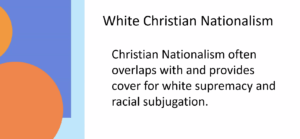 A podcast series and discussion guide also have been created to equip believers for conversations and sermons about the dangers of Christian nationalism.
A podcast series and discussion guide also have been created to equip believers for conversations and sermons about the dangers of Christian nationalism.
The webinar came on the heels of a separate letter signed by 500 Christian leaders denouncing Christian nationalism and its role in the Jan. 6 attack on the U.S. Capitol.
“As leaders in the broad evangelical community, we recognize and condemn the role Christian nationalism played in the violent, racist, anti-American insurrection at the United States Capitol on Jan. 6,” the letter states.
Tyler said letters, podcasts and other actions will not end Christian nationalism any time soon because elements of the ideology have existed since the founding of the nation and are deeply entrenched in American culture. “We are not going to change that in a single conversation.”
But change is possible, Tyler said, explaining that many Americans were surprised and appalled by the violence Christian nationalism unleashed at the Capitol, which now opens a door for dialogue.
“The ambassadors, it’s hard to engage them. But the majority of the United States is somewhere in the middle” and possibly open to learning about Christian nationalism, she said. “We need not be discouraged by those who are more entrenched.”
In addition to BJC, sponsors of the webinar included Christians Against Christian Nationalism, the Cooperative Baptist Fellowship of Texas, Fellowship Southwest, Faith Commons and Faith Forward Dallas.
Related articles:
Interdenominational panel warns of extreme danger of Christian nationalism
Christian nationalism provides cover for white supremacy, BJC leader says
What does Pelagius have to do with Josh Hawley and white nationalism?

